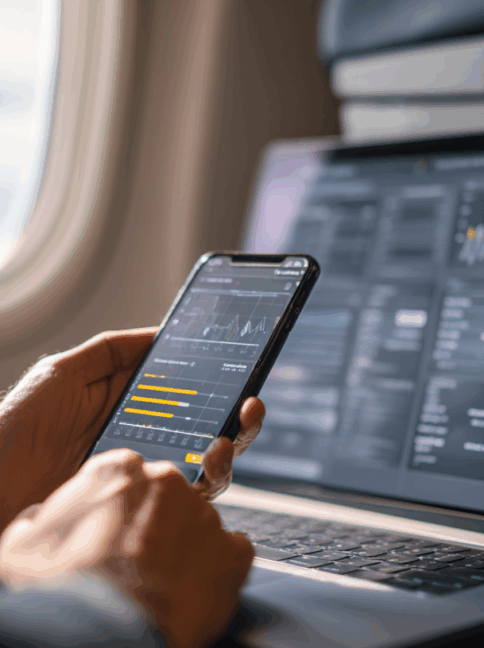In today’s travel industry, AI travel technology is transforming how we plan and book our trips. One of the most groundbreaking innovations in this space is voice-activated booking with NLP (Natural Language Processing). This technology is rapidly changing the way customers interact with booking systems, making the entire process more seamless and convenient. With voice recognition powered by AI, travelers can now book hotels, flights, and activities simply by speaking, creating a hassle-free experience.
As we explore voice-activated booking with NLP, we’ll dive into how it works, its benefits, and why it’s set to revolutionize the future of travel planning. The industry is seeing enhanced customer experiences, allowing users to make bookings more naturally and efficiently.

Understanding AI Travel and Voice-Activated Booking
AI travel technology is transforming how travelers plan trips. Voice-activated booking with NLP (Natural Language Processing) makes interactions seamless, allowing users to manage travel tasks with intuitive voice commands.
What is AI Travel Technology?
AI travel technology uses intelligent systems to streamline the entire travel process. From booking hotels to providing personalized recommendations, AI travel enhances every part of the journey.
The Role of Natural Language Processing
Natural language processing enables computers to understand human language in real time. This technology interprets queries, retrieves key details, and delivers precise responses during travel bookings.
Key Components of NLP in Travel Booking
Intent recognition identifies the purpose behind a query, such as booking a flight. Entity extraction identifies details like dates and destinations, ensuring accurate and smooth NLP interactions.
Speech Recognition in AI Travel
Speech recognition converts spoken words into text, making voice commands accurate and user-friendly. This technology enhances AI travel by handling accents and background noise effectively.
The Evolution of Voice-Activated Booking
Voice-activated booking has evolved from basic commands to handling complex travel requests. With voice-activated booking with NLP, users can now make seamless reservations through natural language.
From Text to Voice: A Paradigm Shift
The shift from text-based to voice-based commands is transforming how travelers plan trips. Voice recognition has made travel bookings faster, more accessible, and user-friendly for a wide range of travelers.
How NLP Enhances Voice Bookings
NLP improves voice bookings by understanding context and resolving ambiguities. It creates a more personalized and accurate booking experience, enhancing customer satisfaction.
Benefits of Voice-Activated Booking with NLP
Voice-activated booking with NLP offers numerous advantages for both travelers and businesses. These systems simplify the booking process, making travel planning faster, more intuitive, and user-friendly.
Convenience and Efficiency for Travelers
Voice-activated booking simplifies travel planning. Travelers can use simple voice commands to make reservations, check flight statuses, or modify bookings, even while multitasking.
Hands-Free Booking Experience
One major advantage of voice-activated booking is its hands-free nature. Users can make travel plans while engaged in other activities, making the process more convenient.
Enhanced Customer Experience
Voice systems offer conversational interactions that enhance the customer experience. Travelers feel like they are speaking with a travel agent, making the process more personalized and engaging.
Personalized Interactions
NLP enables personalized, context-aware conversations. The system remembers user preferences and offers tailored recommendations based on past interactions.
Improved Accuracy in Bookings
By reducing manual data entry, voice-activated booking with NLP minimizes errors. It clarifies ambiguities, leading to more accurate bookings and a smoother experience.
Time-Saving for Both Customers and Businesses
Voice-activated booking saves time for both travelers and businesses. It allows customers to book faster while enabling businesses to handle more inquiries efficiently, boosting productivity.

AI Travel Technology: Enhancing Customer Experience
AI travel technology goes beyond bookings to improve the overall customer journey. It makes travel more seamless and enjoyable by streamlining various processes.
Personalization Through Voice Recognition
Voice recognition identifies users, offering personalized greetings and recommendations based on past preferences. This creates a tailored experience, boosting customer loyalty.
Real-Time Language Translation
AI-powered translation services allow travelers to communicate across language barriers. This technology makes global travel more accessible and enriching.
Predictive Travel Recommendations
AI analyzes past behaviors to offer personalized travel recommendations. These suggestions save time and introduce travelers to new options.
24/7 Customer Support via Voice Assistants
Voice-activated AI assistants provide continuous customer support, handling inquiries anytime. This availability reduces stress and improves the travel experience.
Integrating Voice Commands for Seamless Booking Experiences
Voice commands are now integrated into travel bookings, offering a more seamless and user-friendly experience. This makes the entire process faster, more intuitive, and accessible.
Hotel Reservations via Voice
Users can book hotel rooms using voice commands, specifying preferences with natural language. The system answers questions and completes the booking through voice interaction.
Flight Bookings Using Natural Language
Flight bookings using natural language allow users to specify itineraries easily. The system manages multi-city trips, and seat preferences, and offers alternatives for unavailable flights.
Tour and Activity Scheduling Through Voice Commands
Voice-activated systems let users book tours and activities based on their preferences. This feature enhances the experience by simplifying tour discovery and scheduling.
Restaurant Reservations with Voice Recognition
Restaurant reservations can be made using voice recognition, with users specifying their dining preferences. The system handles the details, creating a smooth, cohesive travel booking experience.

Setting the Standard with Voice Recognition in the Travel Industry
Voice recognition is reshaping customer interactions across the travel industry, setting new standards for efficiency and convenience.
Leading Airlines Adopting Voice-Activated Booking
Airlines are using voice-activated booking systems for check-in and customer service. These systems handle complex queries, providing travelers with accurate and timely information.
Hotel Chains Embracing NLP Technology
Hotels are leveraging NLP technology to enhance bookings and personalize guest services. Voice-activated room controls and concierge services make stays more comfortable and tailored to preferences.
Travel Agencies Leveraging AI for Voice Bookings
Travel agencies use voice-activated AI to offer more personalized and efficient services. These systems quickly search vast travel databases to match clients with their ideal travel options.
Car Rental Companies and Voice-Activated Services
Car rental companies are integrating voice recognition to simplify bookings and vehicle selection. Voice systems guide users through the rental process and answer policy-related questions.
The Future of Travel: Voice-Activated Booking Systems
Voice-activated booking systems are set to become even more widespread and advanced. As these systems evolve, they will revolutionize the way travelers plan and manage their trips.
Emerging Trends in AI Travel Technology
Upcoming innovations include enhanced personalization, integration with wearables, and augmented reality in voice-activated travel planning. These developments will make travel more immersive and seamless.
Potential for Integrated Travel Experiences
The future may bring voice-activated systems that plan entire trips. From transportation to dining, every aspect of the journey could be managed through a single, cohesive platform.
Challenges and Solutions in Voice-Activated Booking
Challenges like privacy concerns and noisy environments affect voice-activated booking. Research is addressing these issues with solutions like noise cancellation and stronger data encryption.
Predictions for the Next Decade of Travel Booking
Experts predict that voice-activated booking will dominate travel planning. We may also see AI travel assistants who can anticipate and book trips based on personal preferences and calendar events.

Choosing the Right AI Travel Technology for Voice Bookings
For businesses adopting voice-activated booking systems, selecting the right AI travel technology is critical for long-term success.
Key Features to Look for in Voice-Activated Booking Systems
Key features include accurate voice recognition, multilingual support, integration capabilities, and strong security. The system should also be capable of learning and improving over time.
Integration Capabilities with Existing Platforms
Seamless integration with current booking systems is vital for a smooth transition. Voice-activated booking should enhance, not disrupt, existing processes.
Scalability and Future-Proofing Your Technology
Choose a system that can grow and adapt to future needs. Regular updates and a clear roadmap ensure the system remains relevant and scalable.
Cost Considerations and ROI
While there are upfront costs to implementing voice-activated booking, the long-term benefits—such as improved efficiency and customer satisfaction—can provide a strong return on investment.

Applied AI: Enhancing Customer Experience with Voice Recognition
Applied AI specializes in voice recognition technology tailored specifically for the travel industry, focusing on improving customer interactions and efficiency.
Applied AI’s Approach to Natural Language Processing
Applied AI uses advanced machine learning algorithms to continually refine its understanding of natural language in travel scenarios. Their system is built to handle complex queries and provide relevant, context-aware responses.
Voice Recognition Technology in Action
Real-world examples show how Applied AI manages intricate travel queries, offering accurate and helpful responses. From booking multi-city trips to handling urgent changes, Applied AI demonstrates the power of its advanced voice recognition.
Benefits for Travel Businesses
Travel companies using Applied AI’s voice recognition technology have seen increased booking rates and enhanced customer satisfaction. The technology also reduces call handling times and boosts first-call resolution rates.
Customer Feedback and Testimonials
Positive feedback from businesses using Applied AI’s voice recognition technology underscores its effectiveness in improving customer service and streamlining the booking process. This technology significantly enhances both business efficiency and user experience.
Voice Assistants: Simplifying Hotel Bookings and Reservations
Voice assistants are revolutionizing the hotel booking process, offering a more convenient and user-friendly experience.
Popular Voice Assistants in the Travel Industry
Well-known assistants like Amazon’s Alexa, Google Assistant, and Apple’s Siri are being integrated into travel booking platforms. These familiar interfaces help users seamlessly transition to voice-activated booking.
How Voice Assistants Handle Hotel Bookings
Voice assistants process hotel bookings by understanding user preferences, finding available options, presenting choices, and confirming reservations. This hands-free process makes hotel bookings easier and more efficient.
Integration with Existing Hotel Management Systems
Voice assistants integrate smoothly with hotel management software, ensuring real-time availability updates and accurate reflection of bookings. This streamlines the entire booking process for both hotels and travelers.
Privacy and Security Considerations
Developers and hotels prioritize security in voice-activated hotel bookings by implementing data encryption, secure authentication, and transparent data usage policies. These measures safeguard user information and ensure secure transactions.

Implementing Voice-Activated Booking in Your Travel Business
A guide for businesses to successfully adopt voice-activated booking technology in the travel industry.
Steps to Adopt AI Travel Technology
The process involves assessing current business needs, evaluating voice-activated booking systems, and planning for seamless integration. Preparing a structured deployment plan ensures that both staff and customers can transition smoothly to the new technology.
Training Staff on Voice-Activated Systems
Proper training is key to effectively using voice-activated technology. Employees should learn how to assist customers, troubleshoot issues, and maximize the system’s features to enhance customer service.
Measuring Success and ROI
To gauge success, businesses must track KPIs like booking completion rates, customer satisfaction, and efficiency improvements. This provides valuable insights into how well the voice-activated booking system is performing.
Continuous Improvement and Updates
Regular updates and feedback-based refinements help keep voice-activated systems relevant and effective. Staying updated on advancements and acting on customer input ensures ongoing optimization.
The Voice-Activated Future of Travel Booking
As discussed, voice-activated booking with NLP is a transformative force in travel planning and execution. It’s not just a trend—it’s a major shift in how travelers interact with booking systems.
Recap of Key Benefits
This technology brings unmatched convenience, boosts customer experiences, and enhances booking accuracy. The ability to provide personalized, real-time support 24/7 makes voice-activated booking invaluable for both travelers and businesses.
Call to Action: Exploring AI Travel Solutions
Now is the perfect time for businesses to adopt AI travel solutions. With the promise of higher efficiency, greater customer satisfaction, and a competitive edge, implementing voice-activated booking technology will drive future growth and innovation across the travel industry.
Glossary of AI Travel Terms
- Natural Language Processing (NLP): Technology that enables computers to understand, interpret, and generate human language.
- Voice Recognition: The ability of a machine or program to receive and interpret dictation or to understand and carry out spoken commands.
- Machine Learning: A subset of AI that provides systems the ability to automatically learn and improve from experience without being explicitly programmed.
- Chatbot: A computer program designed to simulate conversation with human users, especially over the Internet.
- Voice Assistant: A digital assistant that uses voice recognition, speech synthesis, and natural language processing to provide a service through a particular application.
- Intent Recognition: The task of identifying the underlying goal or intention expressed in a user’s input.
- Entity Extraction: The process of identifying and extracting specific information from text data.
- Semantic Analysis: The process of drawing meaning from text by analyzing context and structure.




